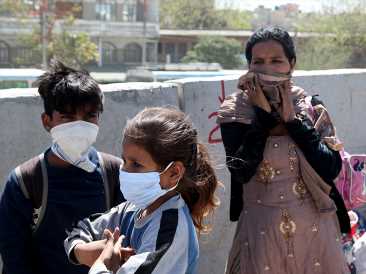COVID-19 vaccine: Low-income countries lose out to wealthy countries

A coalition of scientists, activists, and international organizations warn that next year only 10% of people in 67 low-income countries will be vaccinated against COVID-19.
A coalition of international organizations, backed by previous world leaders and health experts, warn that 90% of people in 67 low income and lower-middle-income countries will not receive vaccinations against COVID-19 in 2021.
The People’s Vaccine Alliance argue this is partly due to rich countries purchasing many times the number of doses of the vaccine necessary to vaccinate their populations. The alliance is a coalition of organizations, including Amnesty International, Global Justice Now, Free the Vaccine, the Yunus Centre, Frontline AIDS, Oxfam, SumOfUs, and UNAIDS.
They call for all vaccine manufacturers to share their intellectual property and technology openly, and for COVID-19 vaccines to be distributed according to need and be free to the public.
Stay informed with live updates on the current COVID-19 outbreak and visit our coronavirus hub for more advice on prevention and treatment.
Vaccine access
The development of safe and effective vaccines for COVID-19 has been a major global achievement.
Vaccine development has previously taken 10–15 years. In comparison, scientists have successfully developed several COVID-19 vaccines in under 1 year.
However, as with any vaccine, developing one that is safe and effective is only part of the story. No matter how effective a vaccine is, if a person is unwilling or unable to be vaccinated, people’s lives will still be threatened.
Researchers have found that vaccine hesitancy is increasing. A September 2020 survey in the United States found that only around half of respondents would definitely or probably be willing to be vaccinated.
However, while vaccine hesitancy is an issue, the key global barrier to being vaccinated is access to vaccines.
Unfair distribution
According to the People’s Vaccine Alliance, in the context of the COVID-19 pandemic, the chief obstacle to access is the ability of low-income nations to purchase significant quantities of the vaccine.
According to Anna Marriott, Oxfam’s health policy manager:
“No one should be blocked from getting a life-saving vaccine because of the country they live in or the amount of money in their pocket. But unless something changes dramatically, billions of people around the world will not receive a safe and effective vaccine for COVID-19 for years to come.”
The People’s Vaccine Alliance highlights that 53% of the most promising vaccines have been bought by rich nations that make up only 14% of the world’s population.
Currently, 96% of the Pfizer-BioNTech vaccine — which has an efficacy of 95% — has been purchased by wealthy countries.
Oxford-AstraZeneca have committed to providing 64% of the doses of their vaccine to developing nations. However, the People’s Vaccine Alliance point out that Oxford-AstraZeneca can only supply 18% of the global population next year.
Further, most of the completed Oxford-AstraZeneca deals are with larger developing countries, such as India and China.
Smaller developing countries are dependent on the World Health Organization’s (WHO) COVAX program — however, the 700 million doses this has secured is only enough to vaccinate 10% of people in the 67 poorer nations identified by the People’s Vaccine Alliance.
A public good?
Consequently, the People’s Vaccine Alliance argue that the technology and intellectual property underpinning the vaccines should be available to the public, since no single company can supply the entire world. COVID-19 vaccines, they argue, should be treated as a public good.
For Heidi Chow, of Global Justice Now, “[a]ll pharmaceutical corporations and research institutions working on a vaccine must share the science, technological know-how, and intellectual property behind their vaccine so we can produce enough safe and effective doses.
“Governments must also ensure the pharmaceutical industry puts people’s lives before profits.”
The People’s Vaccine Alliance point out that the situation is made even more unfair, given that AstraZeneca-Oxford, Moderna, and Pfizer-BioNTech have received more than $5 billion of public funding while developing their vaccines.
According to Dr. Mohga Kamal Yanni, from the People’s Vaccine Alliance, “[r]ich countries have enough doses to vaccinate everyone nearly three times over, while poor countries don’t have enough even to reach health workers and people at risk.” Dr. Yanni continues:
“The current system, where pharmaceutical corporations use government funding for research, retain exclusive rights, and keep their technology secret to boost profits, could cost many lives.”
For live updates on the latest developments regarding the novel coronavirus and COVID-19, click here.
Source: Read Full Article
